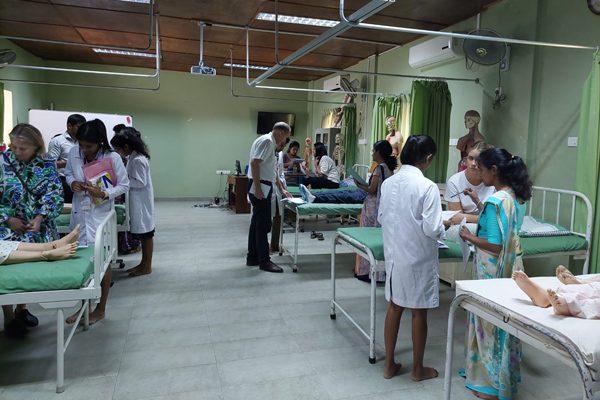Sharing the benefits of pharmacy services in Sri Lanka

Pharmacy volunteers at a Sri Lankan Hospital
In 2009, RBWH Director of Pharmacy Professor Ian Coombes, and his wife, Princess Alexandra Hospital Senior Pharmacist Dr Judith Coombes, along with their three children, moved to Kandy, Sri Lanka for three months to teach at a public university.
Since that first trip, Ian and Judith have returned to Sri Lanka on self-funded trips almost yearly, creating meaningful alliances with public universities and hospitals, along with building support for their work back home.
Fourteen years later, Ian is one of the directors of the Collaboration of Australians and Sri Lankans for Pharmacy Practice, Education and Research (CASPPER).
“Previously, pharmacists in Sri Lanka have had a limited role, namely dispensing drugs, and many people who graduated from pharmacy would end up in pharmaceutical industry or leaving the country to pursue non-clinical PhDs abroad,” Ian said.
“What we have done is show the value of including pharmacists in medical teams to improve health care, such as diabetes, renal and blood pressure management, and essentially help patients with taking their medicines and staying out of hospital.”
On Ian’s latest trip to Sri Lanka in August this year, he was joined by seven other pharmacists, including RBWH Assistant Director of Pharmacy Cancer Care Paul Firman, RBWH Senior Pharmacist Emergency and Trauma Centre Hannah Knowles.
The group lent their expertise through a three-week Train the Trainer program at the University of Sri Jayewardenepura in the country’s capital, running mock wards and leading practical training in hospitals for a range of academics and hospital pharmacists. Alongside this, at the University of Peradeniya, near Kandy, they ran a practical training program for undergraduate pharmacy students.
“What we do is put them into practical contexts,” Ian said.
“It is extremely hard to get into university in Sri Lanka, so these people are the smartest of the smart – they have incredible knowledge. We help them apply this knowledge in patient-centred ways,” Ian said.
“Within days we can see the transformation of these pharmacists, going from a desire to provide patients with too much information, to being patient and problem-centred in their approach.”
On their most recent trip, of the 29 undergraduate students the CASSPER team worked with, 24 came away saying they wanted to work in a hospital in a patient facing role, as they could see firsthand the value of hospital pharmacists in patient care.
Ian and the CASSPER team have also been involved in working with stakeholders to influence the local government on embedding pharmacists in health care teams.
“To make a real impact it’s a long game. It requires continuing input over years, and you have to win trust, build relationships, develop a track record and earn the respect of the people there,” Ian said.
By working with pharmacists in Sri Lanka to have a more patient-centred approach, Ian’s work through CASPPER has had a “ripple effect” and other pharmacists in the country can now see the role and value they can provide in patient care.
“If you have the opportunity to go as part of your professional development, I highly recommend it. It is absolutely hands down the most satisfying thing that I’ve done in my working life.”
For more information about CASPPER, visit their website, Facebook or Instagram.
